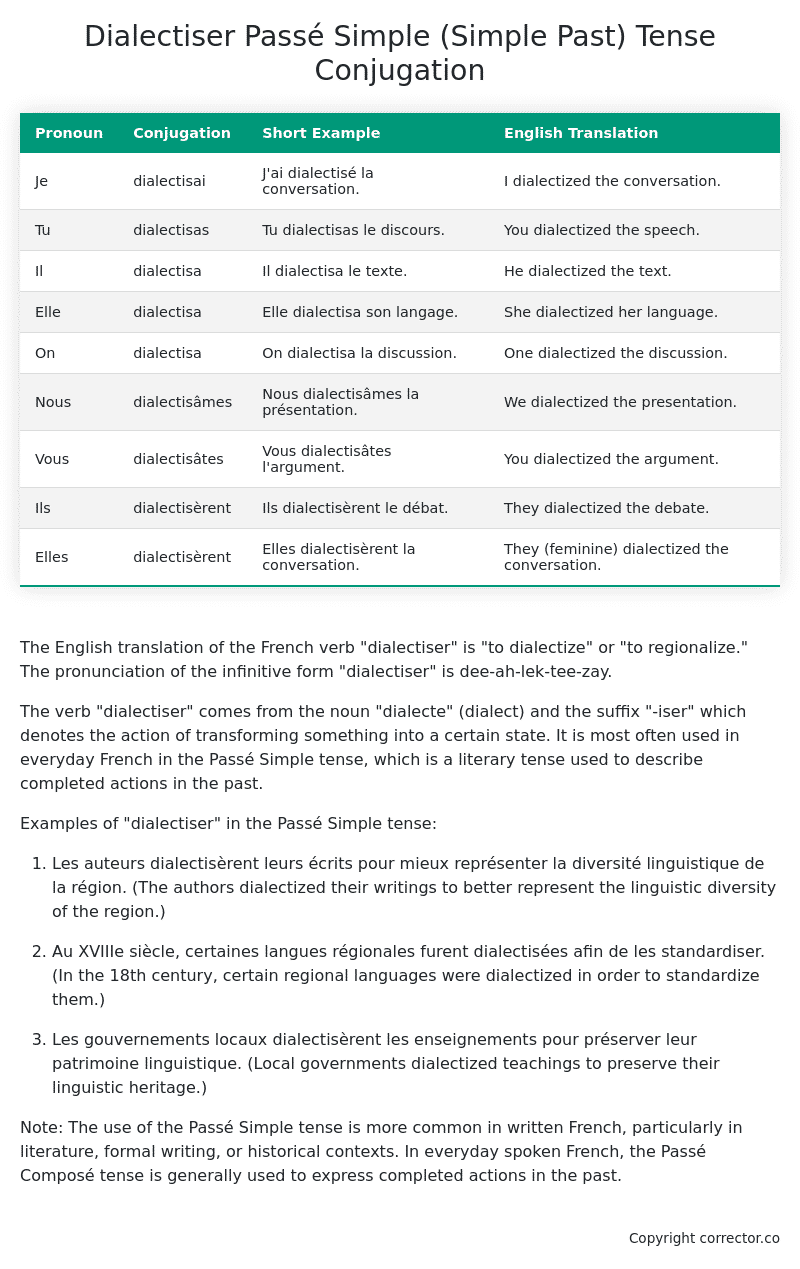Passé Simple (Simple Past) Tense Conjugation of the French Verb dialectiser
Introduction to the verb dialectiser
The English translation of the French verb “dialectiser” is “to dialectize” or “to regionalize.” The pronunciation of the infinitive form “dialectiser” is dee-ah-lek-tee-zay.
The verb “dialectiser” comes from the noun “dialecte” (dialect) and the suffix “-iser” which denotes the action of transforming something into a certain state. It is most often used in everyday French in the Passé Simple tense, which is a literary tense used to describe completed actions in the past.
Examples of “dialectiser” in the Passé Simple tense:
-
Les auteurs dialectisèrent leurs écrits pour mieux représenter la diversité linguistique de la région.
(The authors dialectized their writings to better represent the linguistic diversity of the region.) -
Au XVIIIe siècle, certaines langues régionales furent dialectisées afin de les standardiser.
(In the 18th century, certain regional languages were dialectized in order to standardize them.) -
Les gouvernements locaux dialectisèrent les enseignements pour préserver leur patrimoine linguistique.
(Local governments dialectized teachings to preserve their linguistic heritage.)
Note: The use of the Passé Simple tense is more common in written French, particularly in literature, formal writing, or historical contexts. In everyday spoken French, the Passé Composé tense is generally used to express completed actions in the past.
Table of the Passé Simple (Simple Past) Tense Conjugation of dialectiser
| Pronoun | Conjugation | Short Example | English Translation |
|---|---|---|---|
| Je | dialectisai | J’ai dialectisé la conversation. | I dialectized the conversation. |
| Tu | dialectisas | Tu dialectisas le discours. | You dialectized the speech. |
| Il | dialectisa | Il dialectisa le texte. | He dialectized the text. |
| Elle | dialectisa | Elle dialectisa son langage. | She dialectized her language. |
| On | dialectisa | On dialectisa la discussion. | One dialectized the discussion. |
| Nous | dialectisâmes | Nous dialectisâmes la présentation. | We dialectized the presentation. |
| Vous | dialectisâtes | Vous dialectisâtes l’argument. | You dialectized the argument. |
| Ils | dialectisèrent | Ils dialectisèrent le débat. | They dialectized the debate. |
| Elles | dialectisèrent | Elles dialectisèrent la conversation. | They (feminine) dialectized the conversation. |
Other Conjugations for Dialectiser.
Le Present (Present Tense) Conjugation of the French Verb dialectiser
Imparfait (Imperfect) Tense Conjugation of the French Verb dialectiser
Passé Simple (Simple Past) Tense Conjugation of the French Verb dialectiser (You’re reading it right now!)
Passé Composé (Present Perfect) Tense Conjugation of the French Verb dialectiser
Futur Simple (Simple Future) Tense Conjugation of the French Verb dialectiser
Futur Proche (Near Future) Tense Conjugation of the French Verb dialectiser
Plus-que-parfait (Pluperfect) Tense Conjugation of the French Verb dialectiser
Passé Antérieur (Past Anterior) Tense Conjugation of the French Verb dialectiser
Futur Antérieur (Future Anterior) Tense Conjugation of the French Verb dialectiser
Subjonctif Présent (Subjunctive Present) Tense Conjugation of the French Verb dialectiser
Subjonctif Passé (Subjunctive Past) Tense Conjugation of the French Verb dialectiser
Subjonctif Imparfait (Subjunctive Imperfect) Tense Conjugation of the French Verb dialectiser
Conditionnel Présent (Conditional Present) Tense Conjugation of the French Verb dialectiser
Conditionnel Passé (Conditional Past) Tense Conjugation of the French Verb dialectiser
Conditionnel Passé II (Conditional Past II) Tense Conjugation of the French Verb dialectiser
L’impératif Présent (Imperative Present) Tense Conjugation of the French Verb dialectiser
L’impératif Passé (Imperative Past) Tense Conjugation of the French Verb dialectiser
L’infinitif Présent (Infinitive Present) Tense Conjugation of the French Verb dialectiser
L’infinitif Passé (Infinitive Past) Tense Conjugation of the French Verb dialectiser
Le Participe Présent (Present Participle) Tense Conjugation of the French Verb dialectiser
Le Participe Passé (Past Participle) Tense Conjugation of the French Verb dialectiser
Struggling with French verbs or the language in general? Why not use our free French Grammar Checker – no registration required!
Get a FREE Download Study Sheet of this Conjugation 🔥
Simply right click the image below, click “save image” and get your free reference for the dialectiser Passé Simple tense conjugation!

Dialectiser – About the French Passé Simple (Simple Past) Tense
Formation
Usage
Narration
Historical Context
Interactions with other tenses
Passé Composé
Imparfait
Conditional and Subjunctive
Summary
I hope you enjoyed this article on the verb dialectiser. Still in a learning mood? Check out another TOTALLY random French verb conjugation!


